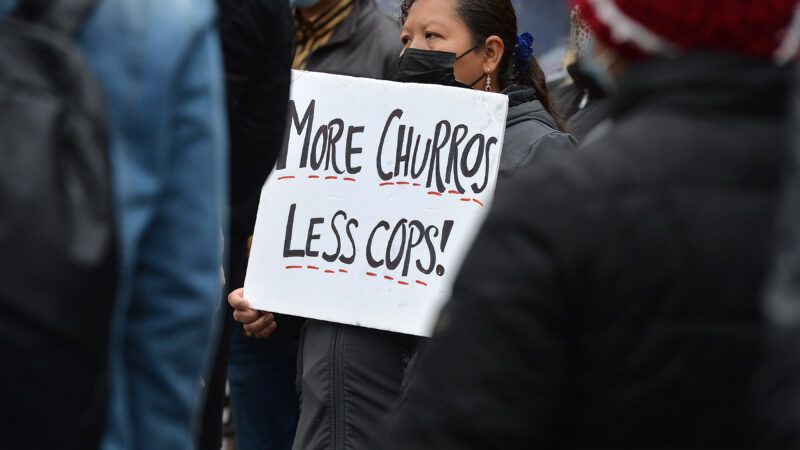Andrew Yang Gets Schooled on New York Street Vendors
The NYC mayoral hopeful tweeted his foot into his mouth.

Last week, former Democratic presidential candidate Andrew Yang, who's running for mayor of New York City, tweeted about the tenuous state many unlicensed food vendors in the city have found themselves in for decades. But rather than supporting those vendors, thousands of whom can't even buy the permits they need to operate legally in the city because of a longstanding and arbitrary city cap on such permits, the candidate implied a Yang administration would make life even harder for them.
"You know what I hear over and over again—that NYC is not enforcing rules against unlicensed street vendors," Yang, currently the frontrunner in the mayoral race, tweeted on Sunday. "I'm for increasing licenses but we should do more for the retailers who are paying rent and trying to survive."
That tweet, Politico reported, "ignite[d] fury on the left." City Comptroller Scott Stringer, who's also running for the city's top job, accused Yang of criminalizing poverty. Others piled on. The tweet drew more than 4,500 comments, with many of them, such as this one, wondering how arresting a mom who's selling churros in a city subway to make ends meet, or similar rule enforcement, would achieve anything positive at all
Yang attempted to clarify his original tweet, but that clarification—which included a bizarre call for "[e]ducation for immigrant/non English speaking vendors on rules of vending"—may have made the situation worse.
In my experience speaking over the years with hundreds of food vendors in New York City and elsewhere—some of whom are indeed immigrants whose first language is not English—I've found vendors already understand the rules of vending. What the food vendors I've spoken with don't understand—and what I don't understand either—is why the rules they must follow are so arbitrary, unfair, and convoluted. It's certainly not to benefit consumers or vendors. Instead, these rules exist only to protect brick-and-mortar restaurants from competition.
Perhaps recognizing this, Yang backtracked on Monday, saying the controversy was a big misunderstanding caused in part by the challenges of discussing policy matters on Twitter. (LOL.) "'I regret that I took on such a frankly complicated and nuanced issue' on Twitter," New York magazine reported. "He also said that his tweet made it 'seem like it's a zero-sum game between unlicensed street vendors and retailers.'"
At a time when more than 1,000 brick-and-mortar restaurants in New York City have shut their doors permanently due to a combination of the ongoing COVID-19 pandemic and city and state restrictions on indoor dining, Yang has sought to position himself as a great champion of city restaurants.
But this is at least Yang's second food-related campaign snafu. In January, he angered New Yorkers by referring to something that is not a bodega as a bodega. He joins a long list of city pols who appear bizarrely uncomfortable around food. "The first scandal of Bill de Blasio's tenure as New York City mayor," USA Today reported in 2014, involved de Blasio eating pizza with a knife and fork.
While the bodega and pizza missteps were minor amusements, Yang's stance on food vendors is troubling and worrying and would reverse some minor gains made by food vendors under current Mayor Bill de Blasio.
As I noted last year, the outgoing Mayor de Blasio, himself an unsuccessful 2020 presidential candidate, made some moves to bring fairness to the city's enforcement of its regulations pertaining to food vendors.
In June, as I discussed here, de Blasio announced the city's police department would no longer be charged with enforcing city food-vending rules. That was an important move. Many of the people put at risk by these policies are immigrants and people of color. At a time when more and more New Yorkers are questioning police tactics for dealing with street vendors, de Blasio's move should promised to reduce needless confrontations between police and food vendors.
And de Blasio also supported legislation, which recently became law, that offers a path to legitimacy for some city street food vendors. That new law, adopted by the city council in February, will expand the number of available food vendor permits—adding a few hundred new permits each year, beginning next year, rather than removing the cap altogether—and establishes an office of street vendor enforcement and a street vending advisory board.
Ten years ago, in a lengthy piece for Reason that you should totally read, advocates I spoke with blasted New York City's awful treatment of food vendors, particularly the permitting process (or absence thereof).
"The Department of Health has capped the amount of food-vending permits," an attorney representing food vendors told me. "And you cannot get one. The waiting list is even closed. But it was 10 or 15 years' wait. It's impossible to get a food vending permit from the city.…If you want to get a permit for your cart or truck, you cannot do it."
Hence, thousands of existing and potential vendors in New York City have waited decades to buy food-vending permits. The city's arbitrary cap on permits doesn't cap the number of vendors. Instead, it incentivizes thousands of vendors to sell food without permits or to obtain permits on the black market.
Andrew Yang's presidential campaign, though unsuccessful, was notable for its ideas. Yang helped to bring proposals such as universal basic income into mainstream conversation. But Yang's serious missteps on the key issue facing New York City's food vendors—in which he relies on the hackneyed misconceptions about food vendors and the city regulations that cruelly and needlessly imperil many of them—suggest his mayoral candidacy might need some new and better ideas.


Show Comments (111)